This site is supported by our readers. We may earn a commission, at no cost to you, if you purchase through links.

These small Tibetan breeds have sensitive stomachs, slow metabolisms, and luxurious double coats that demand specific nutrition.
You’ll want high-quality protein sources, omega fatty acids for coat health, and smaller kibble sizes perfect for their petite mouths.
Look for formulas with digestible ingredients, prebiotics for gut health, and avoid common allergens like corn or artificial preservatives.
Small breed formulas typically work best since they’re calorie-dense and nutrient-rich.
Your Lhasa’s individual sensitivities matter too—some thrive on lamb-based recipes while others prefer chicken.
The right choice balances their palace guardian heritage with modern nutritional science.
Table Of Contents
- Key Takeaways
- Lhasa Apso Nutritional Needs
- Choosing Best Dog Food
- Top 9 Best Dog Foods
- 1. Castor Pollux Beef Stew
- 2. Nulo Frontrunner Small Breed Dog Food
- 3. Farmina Lamb Blueberry Puppy Food
- 4. NUTRO ULTRA Adult Trio Proteins Dog Food
- 5. Wellness Complete Small Breed Dog Food
- 6. Chicken Soup Soul Dog Food
- 7. Merrick Classic Small Breed Dog Food
- 8. Purina Pro Plan Dog Food Probiotics Chicken Rice
- 9. Rachael Ray Nutrish Puppy Dog Food
- Feeding Guidelines and Practices
- Health Benefits and Considerations
- Frequently Asked Questions (FAQs)
- What is the best food to feed a Lhasa Apso?
- What not to feed your Lhasa Apso?
- Do Lhasa Apso have sensitive stomachs?
- Can Lhasa Apsos eat raw food diets?
- What treats are safe for Lhasa Apsos?
- How often should I change dog foods?
- Do Lhasa Apsos need senior dog food?
- Can homemade food replace commercial dog food?
- Conclusion
Key Takeaways
- You’ll need high-quality protein sources (at least 18% for adults, 22.5% for puppies) from real meat like chicken, lamb, or fish to support your Lhasa Apso’s muscle health and luxurious coat.
- Choose small-breed formulas with smaller kibble sizes that fit your dog’s petite mouth, plus omega fatty acids and probiotics to address their sensitive stomachs and digestive issues.
- Avoid common allergens like corn, wheat, soy, and artificial preservatives since Lhasa Apsos are prone to food sensitivities and allergic reactions.
- Feed measured portions twice daily and monitor your dog’s weight closely, as these small dogs have high metabolisms but can easily become overweight with improper portion control.
Lhasa Apso Nutritional Needs
Your Lhasa Apso needs specific nutrition to thrive, including at least 18% protein and 5% fat to support their compact frame and energetic nature.
Understanding these requirements helps you choose foods that prevent common health issues like allergies, joint problems, and obesity while keeping your furry companion healthy and happy, which is crucial for their overall health.
Protein Requirements
Your Lhasa Apso needs high-quality protein sources for muscle maintenance and coat quality.
High-quality protein fuels your Lhasa Apso’s muscle strength and lustrous coat health.
Adult dogs require at least 18% protein, while puppy protein needs reach 22.5% for proper development.
Small breed dogs benefit from food that supports their high metabolic rate.
- Meat-based protein from chicken, lamb, or fish supports better digestion than plant alternatives
- Senior protein requirements remain steady to prevent muscle loss as your dog ages
- High-quality ingredients listed first on labels indicate superior lhasa apso food options
Fat and Carbohydrate Needs
Beyond protein, your Lhasa Apso needs the right balance of healthy fats and complex carbs for ideal energy and weight management.
Fat should exceed 14% to support their luxurious coat and high metabolism.
| Nutrient | Requirement | Purpose |
|---|---|---|
| Fat | Above 14% | Coat health, energy |
| Carbs | 20-30% | Sustained energy |
| Fiber | 3-5% | Digestive health |
Complex carbs from sweet potatoes provide steady glucose levels, while fiber sources aid digestion without excess calories.
These dogs originated in Tibet and served as important watchdogs.
Vitamins and Minerals
Your Lhasa Apso’s vitamins and minerals work like a well-tuned orchestra for peak health.
Vitamin A provides Vision Support and Immunity Boost, while B vitamins fuel energy metabolism.
Calcium and phosphorus deliver Bone Strength, and vitamin E enhances Coat Health.
Quality dog food meets these needs, though Supplement Sources may help address specific deficiencies in your Lhasa Apso diet.
Importance of Probiotics and Prebiotics
Your Lhasa Apso’s gut microbiome houses trillions of beneficial bacteria that support digestive health and immune function.
Dog food with probiotics introduces live cultures, while prebiotics feed existing good bacteria. These supplement sources are particularly important for Lhasa Apsos, who often experience digestive sensitivities.
Quality dog food with prebiotics helps maintain ideal digestion and strengthens your pup’s natural defenses against illness. Probiotics can help by restoring gut balance, which is crucial for achieving optimal dog digestion and overall health.
Choosing Best Dog Food
When choosing the best dog food for your Lhasa Apso, you’ll need to focus on three critical factors that directly impact your dog’s health and wellbeing.
First, avoid harmful ingredients like by-products, corn, soy, wheat, and artificial preservatives that can trigger allergies common in this breed.
Then, select high-quality protein sources such as whole chicken or lamb that appear first on the ingredient list.
Avoiding Harmful Ingredients
You’ll want to steer clear of artificial additives and toxic preservatives that can harm your Lhasa Apso’s health.
By-product dangers and grain sensitivities are real concerns for this breed.
It’s also wise to keep in mind dog food recalls when selecting your dog’s meals.
Key ingredients to avoid:
- BHA, BHT, and ethoxyquin – linked to cancer and organ damage
- Corn, wheat, and soy – common allergens causing food sensitivities
- Generic meat meals – unclear sources with inconsistent quality
- Artificial colors and flavors – trigger allergic reactions without nutritional benefit
Selecting High-Quality Protein Sources
Look for real meat like chicken, lamb, or fish as the first ingredient on your Lhasa Apso’s dog food label.
Meat meals offer concentrated protein with excellent amino acids for muscle development. High-quality ingredients guarantee better protein digestibility than plant-based alternatives.
Novel proteins like duck or venison work well for dogs with sensitivities. Source variety prevents boredom and provides complete nutrition for your pet’s health.
Many owners choose to buy high protein options for their pets.
Considering Small Breed Needs
Small breeds like Lhasa Apsos have unique nutritional requirements that differ substantially from larger dogs.
Their higher metabolic rate means they need more calories per pound of body weight, yet portioning challenges arise because even slight overfeeding leads to obesity.
Breed-specific formulas address these needs with smaller kibble sizes that support dental health and match their exercise needs perfectly, which is crucial for their overall well-being due to their higher metabolic rate.
Top 9 Best Dog Foods
Finding the perfect dog food for your Lhasa Apso requires understanding their specific nutritional needs and health considerations.
After careful research and analysis of ingredients, nutritional profiles, and breed-specific requirements, we’ve compiled this list of nine exceptional dog food options that cater to your Lhasa Apso’s unique dietary needs.
1. Castor Pollux Beef Stew
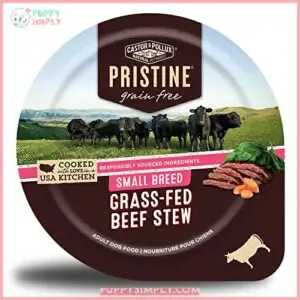
Castor & Pollux Beef Stew delivers premium nutrition specifically crafted for your Lhasa Apso’s needs.
This grain-free wet food features grass-fed beef as the primary ingredient, providing 41-42% protein content that exceeds typical wet food standards.
You’ll appreciate the single-serve 3.5-ounce trays that prevent overfeeding in small breeds.
The recipe contains organic vegetables like spinach and carrots, plus it’s free from artificial preservatives, colors, and flavors.
While it includes 20 synthetic vitamins and minerals for nutritional completeness, this guarantees your dog gets balanced nutrition that meets AAFCO requirements for all life stages.
Best For: Pet owners of small breed dogs, like Lhasa Apsos, who want a grain-free, high-protein wet food with responsibly sourced real beef.
- High protein content (41–42%) from grass-fed beef supports small breed muscle health.
- Convenient single-serve trays prevent overfeeding and are easy for travel or portion control.
- Contains organic vegetables and no artificial colors, flavors, or preservatives.
- Higher price compared to many other wet dog foods on the market.
- Contains 20 synthetic vitamins and minerals, which some owners may wish to avoid.
- Includes processed additives like guar gum and xanthan gum that are controversial for some buyers.
2. Nulo Frontrunner Small Breed Dog Food
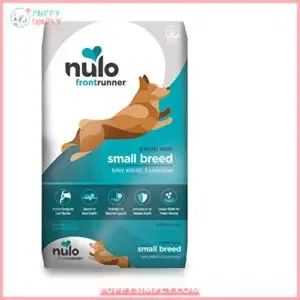
Packed with 77% animal-based protein from deboned turkey and whitefish, this small breed formula delivers exactly what your Lhasa Apso craves.
The ancient grains like quinoa and oats provide steady energy without blood sugar spikes.
You’ll notice the bite-sized kibble makes eating easier for smaller mouths.
BC30 probiotics support digestive health, while omega fatty acids keep that gorgeous coat shiny.
Most owners report their dogs love the taste and thrive on this balanced nutrition.
Best For: Small and toy breed adult dogs, like Lhasa Apsos, that need high animal-based protein, easy-to-eat kibble, and support for digestive and skin health.
- 77% animal-based protein from turkey and whitefish promotes strong muscles and lasting energy.
- Ancient grains and added probiotics support digestion and sustained blood sugar.
- Bite-sized kibble and omega fatty acids keep small dogs’ coats shiny and healthy.
- Some dogs lose interest in the taste after a while.
- Kibble may still be too hard or large for very small or older dogs.
- Not suitable for dogs with certain ingredient sensitivities or allergies.
3. Farmina Lamb Blueberry Puppy Food
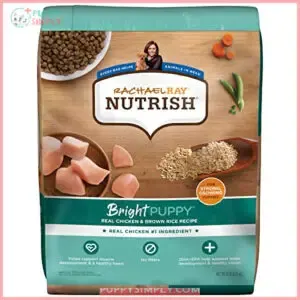
Farmina’s lamb and blueberry formula delivers premium nutrition specifically designed for growing puppies.
This Italian-made food features lamb as the primary protein source, with 96% of protein coming from animal sources. You’ll find regionally sourced lamb, herring, and whole eggs providing essential amino acids for healthy development.
The grain-free recipe includes antioxidant-rich blueberries, sweet orange, and pomegranate to support your Lhasa Apso puppy’s immune system. With added prebiotics and joint-supporting chicken cartilage, this formula promotes digestive health and proper growth for small breed puppies.
Puppies require at least 22.5% protein for ideal growth, making this formula a suitable choice with its focus on animal sources and proper growth.
Best For: Owners seeking a premium, grain-free diet with high animal protein for small breed puppies like Lhasa Apsos.
- Lamb as primary ingredient, providing highly digestible animal protein.
- Includes antioxidant-rich fruits and joint-supporting ingredients for growth.
- Grain-free and low-glycemic, gentle on digestion and supports healthy stool.
- Higher price point compared to standard puppy foods.
- May not suit puppies with lamb allergy or needing grains.
- Premium formula may be harder to find in some local stores.
4. NUTRO ULTRA Adult Trio Proteins Dog Food
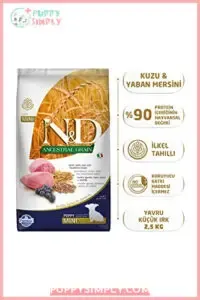
NUTRO ULTRA Adult Trio Proteins Dog Food delivers exceptional nutrition through its chicken, lamb, and salmon protein blend.
You’ll appreciate the 14 superfoods including chia, kale, and blueberries that boost your Lhasa Apso’s health.
The formula contains 24% protein and 15% fat, meeting AAFCO standards for complete nutrition. With no corn, wheat, or soy, it’s ideal for sensitive stomachs.
The kibble size suits small breeds perfectly, while omega fatty acids promote healthy skin and coat.
Best For: Owners of small breed dogs like Lhasa Apsos seeking premium, balanced nutrition with high-quality proteins and superfoods.
- Trio of real chicken, lamb, and salmon for strong muscles and excellent palatability
- 14 superfoods and omega fatty acids support immune health and a shiny coat
- No corn, wheat, soy, or artificial additives, making it gentle on sensitive stomachs
- Premium pricing may be out of reach for some budgets
- Availability can be inconsistent due to sourcing and demand
- Not suitable for dogs with specific protein allergies (chicken, lamb, or fish)
5. Wellness Complete Small Breed Dog Food
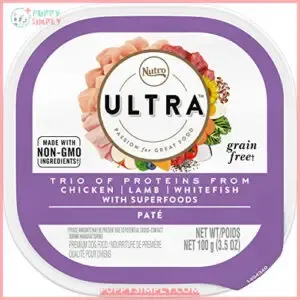
Every discerning pet parent wants premium nutrition that won’t break the bank.
Wellness Complete Small Breed delivers with deboned turkey and chicken meal as primary proteins, providing nearly 300% more protein than fresh chicken alone.
The recipe includes oatmeal, brown rice, and barley for sustained energy, plus salmon meal for omega-3s.
You’ll find guaranteed probiotics, glucosamine, and chondroitin supporting digestion and joints, with a formulation that meets your Lhasa’s high metabolic needs perfectly, featuring 28% protein and 15% fat.
Best For: Owners of small breed dogs seeking high-protein, balanced nutrition tailored to support energy, joints, and digestive health.
- High-quality animal proteins and whole grains provide sustained energy and muscle maintenance.
- Enhanced with probiotics, glucosamine, and chondroitin for digestion and joint support.
- No artificial additives, fillers, or common allergens, with a 5-star independent rating.
- Contains grains, which may not work for dogs with grain sensitivities.
- Premium price point compared to basic dog foods.
- Limited flavor options may not appeal to all picky eaters.
6. Chicken Soup Soul Dog Food
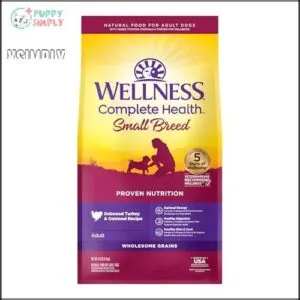
Chicken Soup for the Soul Dog Food delivers protein-rich nutrition with turkey and oatmeal specifically formulated for small breeds like your Lhasa Apso.
You’ll appreciate that real chicken and turkey top the ingredient list, providing 25% minimum crude protein for lean muscle maintenance.
The small-bite kibble makes mealtime manageable for your pup’s petite mouth.
This grain-inclusive formula contains beneficial omega fatty acids, antioxidants from superfoods like blueberries, and probiotics for digestive health.
Made in the USA without corn, wheat, soy, or artificial preservatives, it’s earned a solid 4.5-star rating from independent reviewers.
Best For: Owners of small breed dogs like Lhasa Apsos seeking a high-protein, grain-inclusive diet with quality, natural ingredients.
- Real chicken and turkey as main ingredients provide 25% minimum protein for lean muscle.
- Small-bite kibble with probiotics and omega fatty acids supports whole body and digestive health.
- Made in the USA with no corn, wheat, soy, or artificial additives.
- Higher price point compared to many other brands.
- Some users report excessive dust collecting at the bottom of the bag.
- Small kibble size may not suit larger dogs or those needing dental benefits from bigger bites.
7. Merrick Classic Small Breed Dog Food
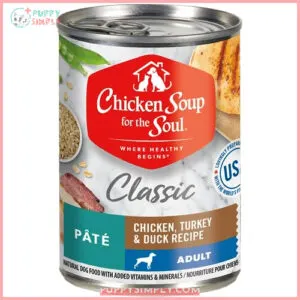
When you’re searching for premium nutrition without breaking the bank, Merrick Classic Small Breed delivers exceptional value.
This grain-inclusive formula features deboned chicken, chicken meal, and turkey meal as primary proteins, meeting your Lhasa Apso’s high-energy needs.
The kibble’s designed specifically for small mouths, making chewing easier while reducing plaque buildup.
With leading levels of glucosamine and chondroitin for joint support, plus probiotics for digestive health, it’s a solid choice that consistently earns high marks from both picky eaters and their owners, providing high marks.
Best For: Small-breed dog owners seeking affordable, protein-rich nutrition with premium ingredients and targeted support for joint and digestive health.
- Not suitable for dogs with chicken or fish allergies.
- Rich formula may require careful portion control to avoid digestive upset.
- Contains menadione (synthetic vitamin K), which may concern some owners.
- Specially designed kibble for small mouths, helping reduce plaque.
- High-quality proteins and whole grains support energy and lean muscle.
- Includes glucosamine, chondroitin, and probiotics for joint and digestive wellness.
8. Purina Pro Plan Dog Food Probiotics Chicken Rice
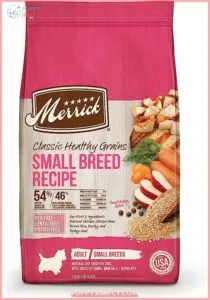
When you’re looking for a science-backed approach to your Lhasa Apso’s nutrition, Purina Pro Plan delivers proven results.
This small breed formula features real chicken as the first ingredient, providing 29-30% protein to support lean muscle mass.
You’ll appreciate the guaranteed live probiotics (Bacillus coagulans) that maintain gut health during stress.
The 397 kcal/cup density meets your energetic pup’s needs while omega-6 fatty acids promote a shiny coat.
Veterinarians widely recommend this brand for its rigorous testing and balanced nutrition.
Best For: Small breed dogs like Lhasa Apsos needing high protein, easy digestion, and joint support.
- Real chicken as the first ingredient with high protein for muscle health.
- Guaranteed probiotics and whole grains aid digestion and gut balance.
- High-quality, USA-made, and widely recommended by veterinarians.
- Pricier than many competing small-breed dog foods.
- Recent bag size changes and packaging frustrations.
- Some users report inconsistent bag fill and delivery issues.
9. Rachael Ray Nutrish Puppy Dog Food
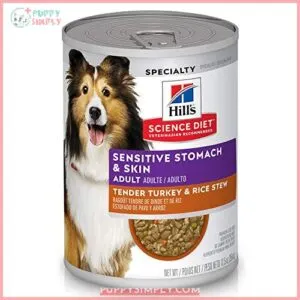
Real chicken takes center stage as the first ingredient in Rachael Ray Nutrish Puppy Dog Food, delivering 28% protein for your Lhasa Apso’s growth.
This affordable formula includes DHA and EPA for brain development, plus omega fatty acids for coat health.
The kibble might be slightly large for tiny mouths, but you can soften it with water.
With nearly 950 positive reviews and no artificial preservatives, it’s a solid choice that supports animal welfare through The Rachael Ray Foundation.
Best For: Owners of growing small breed puppies like Lhasa Apsos who want high-protein, affordable nutrition with real ingredients and coat health support.
- Real chicken as the first ingredient provides quality protein for growth.
- Includes DHA, EPA, and omegas for brain and coat development.
- No artificial flavors or preservatives, and supports animal welfare.
- Kibble size may be too large or hard for very small puppies unless softened.
- Not suited for grain-sensitive or allergy-prone dogs.
- Mixed reviews on taste and some issues with kibble appearance.
Feeding Guidelines and Practices
Feeding your Lhasa Apso the right amount at the correct times prevents obesity and supports their overall health.
You’ll need to adjust portions based on your dog’s age, activity level, and weight while establishing consistent meal schedules.
Portion Control and Feeding Schedules
Beyond standard twice-daily meals, your Lhasa Apso’s feeding schedule needs careful attention to meal frequency and portion control.
Puppies require three to four daily feedings, while seniors benefit from adjusted portions based on their activity levels.
Some owners carefully consider specific Lhasa Apso portions for their dogs.
- Puppy schedules: Three to four small meals prevent hypoglycemia in growing dogs
- Adult routine: Two measured meals daily maintain steady energy and digestion
- Senior adjustments: Smaller, more frequent portions support aging metabolism
- Weight monitoring: Regular weigh-ins help you adjust portions before problems develop
Adjusting Calorie Intake Based on Activity Level
Your Lhasa Apso’s Activity Calorie Needs fluctuate based on their energy output.
Active pups burning calories through Exercise Calorie Burn require 20-30% more dog food than couch potatoes.
Puppy Calorie Adjustment demands higher intake for growing bodies, while Senior Calorie Needs decrease with age.
Weather Calorie Impact matters too—cold weather increases calorie requirements.
Match your ideal calorie intake to your Lhasa Apso’s activity level for peak health.
Monitoring Weight and Health
Regular weight checks keep your Lhasa Apso healthy and catch problems early.
Watch for changes in eating habits, energy levels, and body shape to prevent serious health issues.
- Weekly weigh-ins – Track weight changes using a pet scale or vet visits for consistent monitoring
- Body condition scoring – Feel for ribs under a thin fat layer; visible waist indicates proper weight
- Monthly vet checkups – Professional assessments catch Obesity Risks and health changes before they worsen
- Coat condition monitoring – Dull, brittle fur often signals nutritional deficiencies or underlying health problems
- Activity adjustments tracking – Note decreased playfulness or reluctance to exercise as potential weight-related warning signs
Watch for Dental Health issues during examinations, as poor oral health affects overall nutrition and weight management in Lhasa Apsos.
Health Benefits and Considerations
Your Lhasa Apso’s unique health needs require careful food selection to manage common breed-specific issues.
The right diet can prevent allergies, support joint health, and maintain digestive wellness throughout your dog’s life.
Managing Allergies and Sensitivities
Many Lhasa Apsos develop food allergies, with beef, chicken, and dairy being common culprits.
Watch for allergy symptoms like persistent itching, skin irritations, and ear infections.
Limited ingredient diets featuring novel proteins such as duck or lamb help identify triggers.
Hypoallergenic dog food with hydrolyzed proteins reduces reactions.
For immediate relief, consider antihistamines like Benadryl after consulting with your vet.
Always schedule vet consultation before switching foods, as food sensitivities require careful management through elimination diets.
Supporting Joint Health and Digestion
Joint health becomes your priority as your Lhasa Apso ages.
Omega-3 benefits include reduced inflammation, while glucosamine dosage supports cartilage repair.
Fiber sources like sweet potatoes aid Lhasa Apso digestion alongside probiotic strains that balance gut bacteria.
Supporting your dog’s gut with daily probiotic supplements can aid digestion.
Digestive enzymes help break down nutrients efficiently.
Quality foods combining these elements protect your dog’s mobility and digestive comfort throughout their lifetime.
Frequently Asked Questions (FAQs)
What is the best food to feed a Lhasa Apso?
Choose high-quality protein sources like chicken or salmon with 18% minimum protein. Avoid grains, by-products, and artificial additives. Feed twice daily with measured portions to prevent obesity.
What not to feed your Lhasa Apso?
Like Pandora’s box releasing troubles into the world, you’ll want to avoid feeding your Lhasa Apso certain foods.
Skip by-products, soy, corn, wheat, artificial additives, and human food—these can trigger allergies and digestive issues in your pup.
Do Lhasa Apso have sensitive stomachs?
Yes, Lhasa Apsos often have sensitive stomachs and are prone to food allergies, gastrointestinal issues like vomiting and diarrhea, and digestive problems from food intolerances or improper diets.
Can Lhasa Apsos eat raw food diets?
Lhasa Apsos can eat raw diets, but they’re prone to food sensitivities and digestive issues.
Raw feeding requires careful planning to avoid nutritional imbalances and bacterial contamination that could worsen their sensitive stomachs.
What treats are safe for Lhasa Apsos?
Safe treats for your Lhasa Apso include single-ingredient options like freeze-dried chicken, sweet potato chews, and blueberries. Avoid chocolate, grapes, onions, and high-fat treats that could trigger pancreatitis or allergies.
How often should I change dog foods?
You shouldn’t change dog foods frequently unless there’s a specific health reason.
Stick with one high-quality food that works well for your Lhasa Apso.
Constant switching can upset their sensitive digestive system and cause unnecessary stomach issues.
Do Lhasa Apsos need senior dog food?
Senior food becomes beneficial for Lhasa Apsos around seven years old when their metabolism slows and they’re less active.
It contains fewer calories and joint-supporting nutrients to prevent weight gain and maintain their health.
Can homemade food replace commercial dog food?
Like switching from takeout to home cooking, homemade food can replace commercial dog food, but it’s tricky business.
You’ll need veterinary guidance to guarantee balanced nutrition, proper portions, and avoid dangerous ingredients.
Conclusion
While luxury and practicality rarely align perfectly, finding the best dog food for Lhasa Apsos bridges this gap beautifully.
You’ve discovered nine exceptional options that cater to your dog’s royal lineage and modern health needs.
Each formula addresses their sensitive digestion, coat requirements, and small breed metabolism.
Remember to switch foods gradually and monitor your Lhasa’s response, as the right nutrition transforms these ancient palace guardians into thriving modern companions, supporting their health from puppy years through their golden decade, with a focus on their sensitive digestion and overall health needs.
- https://www.eachpaw.com/blogs/the-latest/best-diet-for-lhasa-apso-nutrition-tips-and-food-recommendations
- https://www.petmd.com/dog/breeds/lhasa-apso
- https://iheartdogs.com/ideal-diet-for-lhasa-apsos-the-ultimate-lhasa-apso-feeding-guide/
- https://www.thefarmersdog.com/breed/lhasa-apso
- https://www.zooplus.com/feedback/shop/dogs/dry_dog_food/taste_of_the_wild/409303













